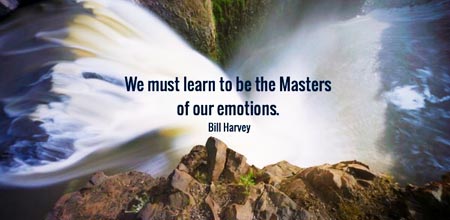Created March 31, 2023
Welcome to this week’s Bill Harvey Blog.
To read Powerful Mind Pt. 3, click here.
Chapter 2
The Observer State
A clearer, more effective state of consciousness —
only seconds away from your daily state of consciousness.
Just knowing it exists can benefit you
This entire book is about states of consciousness. In this chapter we will focus on one particular state of consciousness we call the Observer state. The Observer state is more powerful than the state most of us are in most of the time, and leads to the Flow state, which is more powerful still in terms of your ability to make an impact on others around you and on the world. We speak about both states as being “The Upper Mind”. The purpose of this book is to show you the simple yet easily missed doorways into the Upper Mind.
Why is it important to think about consciousness at all? Because life is all about consciousness. We do not exist without consciousness. While modern science has made brilliant progress in almost every other sphere of reality, too little is known about consciousness.
Yet all the ills of the world are rooted in ignorance of how consciousness works. We have made the world we see around us. It all started in our minds. Every day we do things we regret because we listen to and act on whatever our minds dish up to us. We need our minds to perform better, to become powerful, to gain insight into ourselves and others, to come to better decisions on a moment to moment basis.
The extreme anti-heroes who have become powerful on the world stage, who have driven much of our history so far, might not have chosen paths of destruction if their genius had been creatively channeled, if they had not lost touch with their compassion and love.
If we collectively knew our own minds better we would not go to war but rather we would find creative win/win solutions — the ones we get to in the end anyway after all the bloodshed. The path to a better world lies through the terrain of consciousness. One day when we all really do know our minds better the world will be a relative paradise compared to the way it has been throughout all recorded history. As the great science fiction pioneer H.G. Wells said, “History is a race between education and destruction.” If we can make our minds powerful now, we can gain the maturity as a race necessary to not destroy ourselves, given the extreme weaponry we have now at our disposal and our habitual disregard of our destructive effect on the environment (the air we breathe, the water we drink).
Because war is a pattern repeated throughout recorded history, we tend to assume this is the way it has to always be. And yet, “recorded history” literally means since the onset of written language. In short, written language and the thinking processes that go with it have led to acceleritis, information overload and Emergency Oversimplification Procedure (EOP), which blocks upper mind and leads not only to war but also to crime and personal cruelty born of our disconnection from innate compassion. Our minds need to become more powerful in order not to be confused by the information overload so much that we are easily led and manipulated into a life nearly devoid of positive feelings, squandering the opportunity of life.
Each of us knows intuitively that the only thing we can change is ourselves. This is the only way we can make a better world.
Powerful Mind seeks to reveal specific information and techniques for attaining specific states of consciousness. We will be talking about waking states of consciousness, not about sleeping states. Sleeping states are important too, but in the interest of focus we’ll leave these to another book.
A Broader View of What Science Is
Around 400 BC, in the Golden Age of Greek philosophy, one branch of philosophy called “epistemology” focused on understanding “how can we know”? Over time, different schools of thought evolved about how we can know: rationalists believe that we can know things directly through our intellect; authoritarians believe we know by listening to authority figures who tell us what we know; empiricists believe that we know by direct experience, by testing things in the real world; intuitionists believe we can know directly through a mysterious faculty.
Science developed out of empiricism, basing what we consider to be “truth” on factual experience, testing and validation. In the case of science as practiced in the West, especially in the last few hundred years, that “experience” is usually the taking of measurements using instruments with dials and displays from which one takes readings. The person taking the readings is the “observer” often mentioned in relativity and quantum mechanics, the latest forms of science. In the East, science is also based on experience, and there the experience can often be inner experience where dials and displays are not involved. This is still science and still based on empirical experience.
This Eastern willingness to accept internal evidence explains why science in the West has not validated the existence of the more effective states of consciousness. Starting toward the end of the 19th Century, inner experience or introspection fell out of favor in psychology, after William James, the last of the giants of psychology to accept inner evidence directly. The more externally-oriented culture of the West created a blind spot. In psychology, work shifted to behaviorism, the focus on externally quantifiable actions, along with the study and social application of conditioning to alter these actions.
Eastern epistemology actually fuses empiricism and intuitionism. No conflict is seen between these ways of knowing because they both involve experiencing reality for oneself.
Although based on empiricism, Western science became authoritarian and elitist in its epistemology: the common person was excluded from “knowing” by the reduction of all science to mathematics, a difficult language to master. Science at its cutting edge moved out of the sphere of something the common person could totally visualize and comprehend.
Science and States of Consciousness
Regarded academically as a “soft science”, traditional Western psychology recognizes only three states of consciousness: dreamless sleep, dream sleep, and waking consciousness. Eastern psychology since the fifth century B.C. recognized ten states of waking consciousness: the normal everyday waking state, the access state which precedes meditation, and eight progressively deeper states of meditation. Oscar Ichazo, a modern student/teacher of consciousness techniques and founder of the Arica Institute in 1968, fuses ideas from consciousness explorers throughout history (plus his own) to propose fifteen waking states of consciousness ranging from psychosis, through six levels of neurosis, three levels corresponding to the Eastern access state, and five levels of higher consciousness.
It is revealing that Western psychology reduces waking consciousness to a single state. William James was the first prominent Western psychologist who warned against “prematurely closing the book” on the existence of other states of waking consciousness. More recently, Mihaly Czikszenthmihalyi (pronounced “cheek-sent-me-high-ee”), former head of the University of Chicago Psychology Department, coined the term “Flow state” (known in show business as “Being On”, and in sports as “The Zone”), and conducted valuable research into this state, which was published in his 2008 book Flow: The Psychology of Optimal Experience.
Details to follow in the subsequent posts.
Love to all,
Bill


